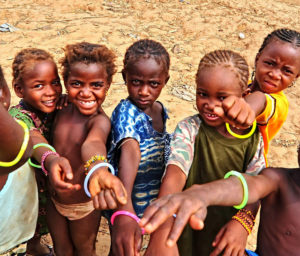Rooted in a firm faith, Senegalese Muslims accord a great deal of importance to their children’s Koranic education. While some parents send their children to Koranic schools (Daara) only during the school holidays, others opt for a full-time education at a boarding school.

However, the flipside of this choice is that many of these young people are turned into beggars by their teacher, known as a “Daara Serigne” or marabout. The child, or talibé in the Senegalese language, is the student. He is placed under the tutelage of the teacher by his father. According to the map of Koranic schools in Dakar (Moussa, 2014), around 60,000 talibé children can be found in thousands of Daara schools in Dakar.
These children don’t go to school, are often very poorly dressed and some of them have untreated illnesses and injuries. They eat food scrounged here and there from different places, sometimes sleep in the street and are forced by their marabout to bring in a fixed sum of money every day. This sight, although disconcertingly normal, nonetheless flouts these children’s most basic human rights.
In fact, Article 4 of the 1959 Declaration of the Rights of the Child stipulates that “the child must benefit from social security; he or she must be able to grow up and develop in a healthy way (…), the child has the right to adequate nourishment, housing, free time and medical care” (General Assembly of the United Nations). Begging undercuts all of these rights; rights which are essential for the physical and mental development of a child.
A cruel lack of awareness of children’s rights
In societies worldwide, children’s education is the responsibility of adults (parents, family, community and the government). Accordingly, Senegal largely agrees to take on this duty, and recognizes it as a right. In its 2001 Constitution, which has been changed many times, the Senegalese constituent stipulates that “all children, boys and girls, in all areas of national territory, have the right to go to school.
However, the phenomenon of begging remains very much present in Senegal and creates a barrier to schooling, in spite of the existence of many schools, public and private, designed to fulfil the right to education.
Child beggars are also exposed to all sorts of dangers to their physical and moral well-being (Seneweb News, 2015), not to mention the care and good nourishment they do not get to experience. They are constantly in a vulnerable position (Metrodakar, 2016), in spite of all the state measures taken by the Committee for the Protection of Children – la Cellule d’Appui à la Protection de l’Enfance (C.A.P.E) – based in Dakar, and the social initiatives put in place to eradicate begging amongst children.
A form of child trafficking
Certain people try to justify begging; particularly those who benefit from it. In fact, young beggars are sent out into the street either by their marabout or their parents or guardians. Since they don’t have the means to feed these children, the root cause of the situation is therefore poverty. The people responsible for protecting them and tending to their needs are actually exploiting them.
Begging is a new form of human slavery which society seems to allow and tolerate – all in the name of a religion which, in principle, fiercely protects fundamental human rights .
Written by : Khady Ngom Translated by : Izzy Fitzharris Proofread by : Stephanie Staab |
Assemblée Générale des Nations Unies, Déclaration des Droits de l’Enfant, 20 nov. 1959, principe 4.
Constitution du Sénégal, 2001, art. 22, al. 2.
Metrodakar (20/04/2016). Le Sénégal face aux problèmes de la mendicité : Pédophilie, maltraitance, maladie, meurtre… A qui la faute?. Consulté sur Metrodakar.
Moussa keita (13/03/2014). CARTOGRAPHIE DES DAARAS DANS LA REGION DE DAKAR – «Plus de 53% des enfants pratiquent la mendicité entre 13h et 17h». Consulté sur Rewmi.
Seneweb News (10/08/2015). Thiès: Un homme égorge un talibé et éventre 2 autres. Consulté sur Seneweb .

